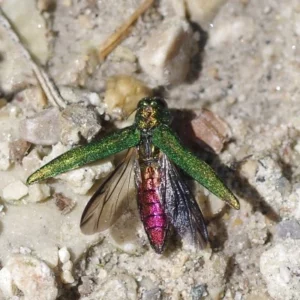Note: Most links leave to external sites.
Greetings BugFans,
YAY, it’s June! That means that the BugLady is out on the trails, walking slowly, looking at everything and photographing half of it. A probably-tasteful BOTW will be delivered to your inbox each Tuesday in June, but it won’t be a newly-minted, original episode.
It’s also June – National Invasive Species Action Month! “Alien,” “Introduced,” “Exotic,” and “Non-native” are all words we use to describe species that aren’t from around here, like alfalfa and Golden retrievers, but those words are not synonymous with the word Invasive. Having left their predators in the Old Country, invasive species achieve populations that negatively affect their habitat and native species. Not all invasive species are from another continent – Rusty crayfish, invasive in Wisconsin, hail from the southeastern part of the country.
Here, from the BugLady’s massive “Bugs in the News” file is an article about an invasive hornet that is NOT the Asian giant/Murder hornet (which has been given the new, less offensive name Northern giant hornet).

And one about an invasive tick.
And speaking of ticks, the BOTW about Deer ticks is worth a reread, since the deer tick season has been in high gear here in God’s Country for months.

Accompanying these articles are pictures of a Eurasian butterfly that we often forget is not native – the Cabbage Butterfly, which introduced itself into Canada 150 years ago and whose caterpillar was, for a long time, called the “Imported Cabbageworm” (if you’re a gardener, you probably know this one already).

And a picture of a really beautiful little beetle that arrived in the Detroit area from China about 20 years ago and that has changed the landscape here in Wisconsin and in much of North America east of the Great Plains – the Emerald ash borer (EAB). When it first appeared, the DNR predicted that it would demolish 99.9% of Wisconsin’s ash trees. Their flight period is about to start.
And a Deer tick.
Not all invasive species are insects – see the Southeast Wisconsin Invasive Species Consortium (SEWISC) for information about invasives near you (they’d love a donation, too).
For more information about the organizations that are educating about and fighting invasives in Wisconsin.
The BugLady
